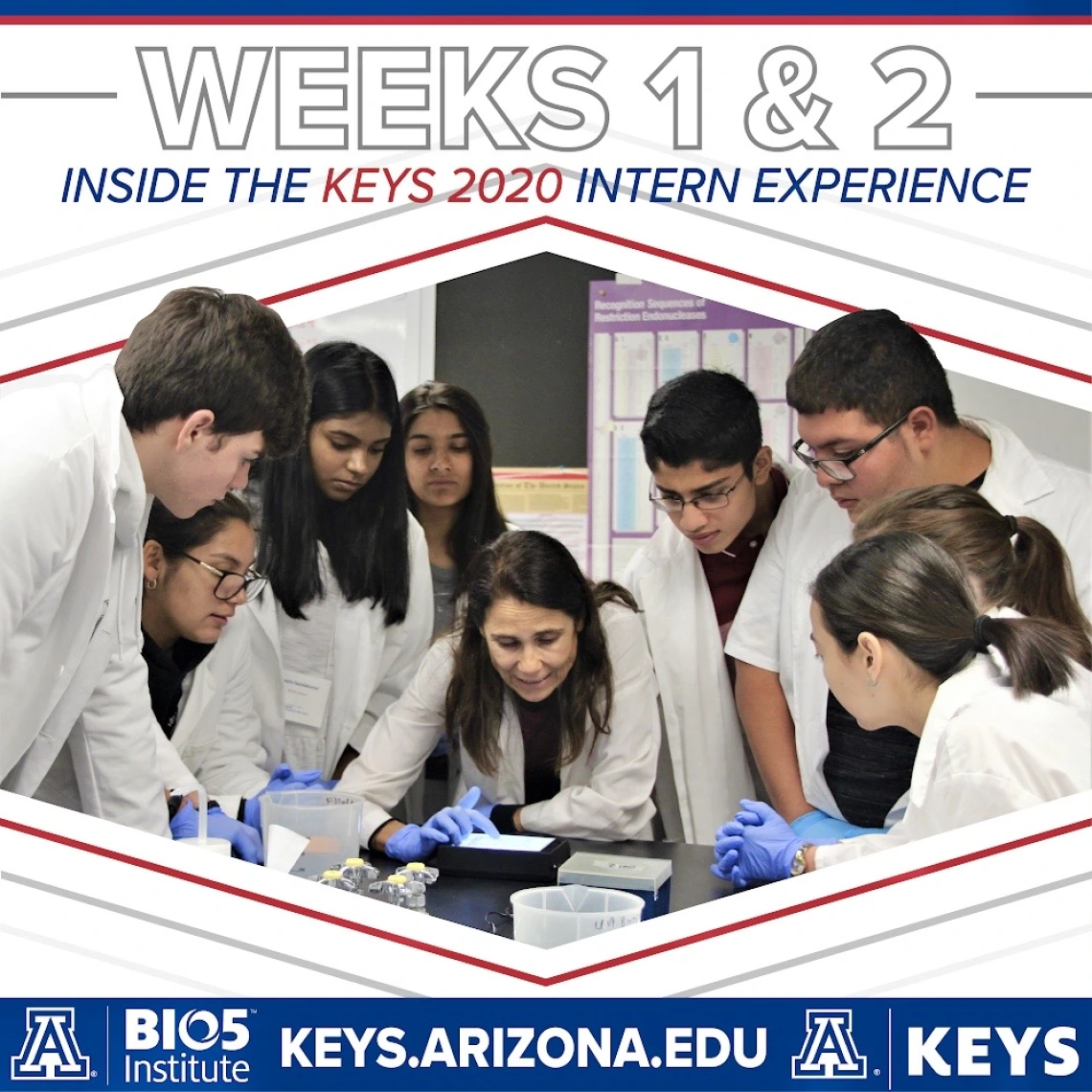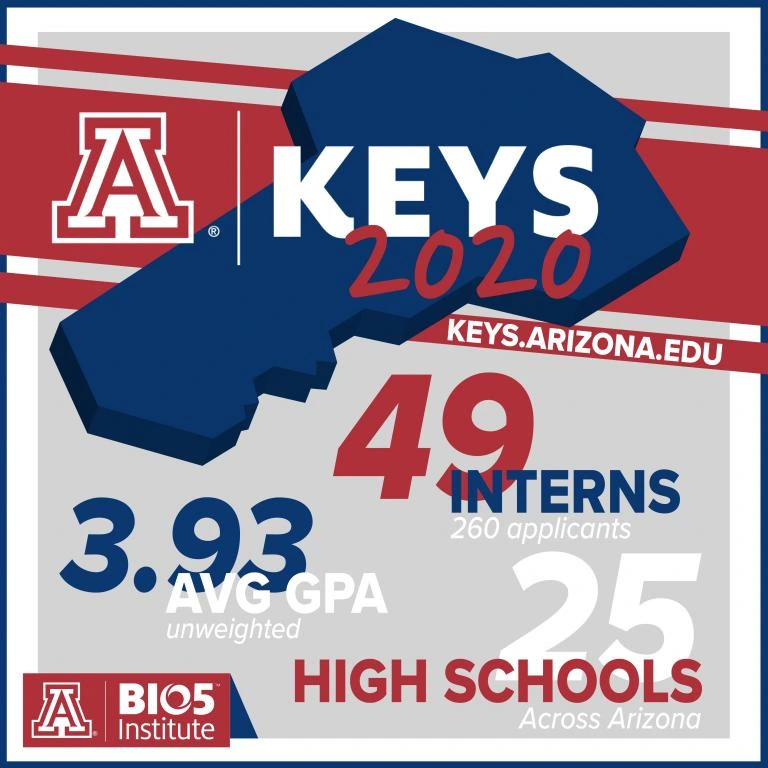KEYS Check-In – Weeks 1 & 2
Follow along with four KEYS interns as they experience the highs and lows of engaging in a remote data science research internship from home.

Two weeks ago, forty-nine Arizona high schoolers began a unique summer research experience…from behind their computer screens. On June 8, the BIO5 Institute virtually launched the Keep Engaging Youth in Science (KEYS) Research Internship Program, an internship that empowers students to explore scientific discovery and advance their professional and personal goals.
Since 2007, the KEYS program has brought students to the University of Arizona campus for a seven-week internship. Talented high school students are typically matched with the university’s top faculty to conduct hands-on research projects in the biosciences. Due to COVID-19 restrictions, KEYS program coordinators Brooke Moreno and Kelle Hyland quickly adapted the traditional in-person programming to a virtual experience.
“It’s crazy realizing that four months ago, this research internship was supposed to be in-person…They were able to create a program that is organized and well-executed in such a short amount of time,” said Nikhil Mathur, KEYS intern and upcoming senior at Tucson’s University High School.
Before joining their labs, interns were immersed in a full week of training. Experts taught the students about scientific collaboration, programming languages, computational applications, and data management in preparation for their remote research projects. KEYS coordinators Moreno and Hyland also led discussions on reading and discussing scientific papers, research presentations and scientific writing to enhance the interns’ scientific literacy.
After Training Week, KEYS interns were introduced to their new labs and began their projects. The interns are working with several programing languages and computer software to screen for potential neurodegenerative diseases therapies, assess the impact of the COVID-19 pandemic on urban communities, and analyze brain MRIs.
“This is a big deal. We’re looking at something so important at the high school age. It’s just amazing,” Nikhil said.
The KEYS Crew, comprised of alumni and undergraduate student mentors, are fostering a sense of community by creating themed computer backgrounds for their interns. They are also hosting virtual KEYS socials, the first of which gave interns a chance to show off their furry, feathered, or scaly friends with a pet show and tell.
“We all agreed that we appreciate our pets wholeheartedly, especially during these scary and unpredictable times as they provide us with joy, emotional support, and a sense of comfort and security we all desire,” said Marissa Romero, KEYS Crew member and 2020 UArizona graduate.
Nikhil was anxious the night before KEYS started.
“I was a little bit nervous,” he said. “It almost felt like going to school again.”
Nikhil is working with Dr. Pascale Charest, associate professor of molecular and cellular biology, to determine the connection between a cellular complex and cancer cell migration. Nikhil is working with three other KEYS interns to scour the literature for published research papers on this topic. The team will then use computer programs to determine if there are statistically significant correlations between the findings.
“What I’ve really liked about all of the things we’ve learned is that there’s real-world implications to them,” he said. “We’re not just looking at a textbook in biology. We’re actually hands-on, even virtually.”
During his first week in the lab, Nikhil read more than 10 primary research papers filled with scientific jargon he’s never encountered before. However, he said Moreno prepared him to take on this large feat through her memorable exercise in reading a paper on penguin feces during Training Week.
Joining Nikhil is his sister Esha Mathur, also an incoming senior at University High School. Esha is working in the lab of Dr. Bonnie Hurwitz, assistant professor of agricultural and biosystems engineering. Her project entails analyzing different viruses and bacteria found in mosses and lichens. She’s using a computer program called RStudio to manage and simplify large data sets of moss metagenomes. The RStudio Training Week lecture gave Esha a solid foundation upon which to begin her research.
Hurwitz and Esha’s mentor, postdoctoral fellow Dr. Alise Ponsero, have been incredibly supportive of her as she navigates using a programming language to tackle this project. They remind her to take as many breaks as she needs to support her mental health and are available to help her with challenging and stressful aspects of her project.
Most of all, Esha is enjoying the social aspect of KEYS. She’s been able to talk with the other interns through breakout and chat rooms through Zoom, and she’s enjoyed playing virtual board games together.
“We became really close to each other during the training week,” she said.
Sonia Mathur is working with Dr. Leif Abrell, associate research scientist in the Department of Environmental Science. She’s using a large data set to understand the contamination of harvested rainwater. During her first week, Sonia began a "microproject" using Microsoft Excel to reorganize survey responses from Project Harvest, a study which asks community members to collect rainwater at their homes and conduct basic science experiments with their samples. The goal of the project is to determine if the harvested rainwater can be safely used for garden and household use.
Though originally nervous about meeting her lab members, Sonia now feels right at home. During their first virtual meeting, they broke the ice by sharing fun facts and laughs.
“I can tell that they’re super enthusiastic to be working with me, and I’m super enthusiastic to be working with them,” Sonia said.
Throughout the week she’s been able to contact her mentors through email and online chat platforms, and they quickly provide her with the resources and guidance she needs to succeed. Sonia said it is incredibly reassuring to know they are available to help her navigate her remote internship.
Sonia also raves about the social aspect of the KEYS program. She especially enjoyed pet show and tell because it was a great way for her to relax and destress at the end of a long day.
Christina Niyigena is a Flinn Scholar and an incoming freshman at the UArizona. She is working with Dr. Michael Marty, assistant professor in the Department of Chemistry and Biochemistry, to design computer software that will analyze mass spectrometry data. During her first week in the lab, Christina was tasked with transferring files between four different computer programs and languages, including Python and UniDec. Having no formal education in computer science, Christina is grateful that Marty and her graduate mentor, Marius Kostelic, virtually meet with her every day and are always available to provide support.
“In a week, I’ve learned so much about programming than I have in my entire life,” she said.
In addition to learning computer science for the first time, Christina is also challenged with staying organized. Her family moved this past week, and she’s also juggling KEYS with taking care of her siblings and completing a Joint Technical Education District (JTED) course.
“This is really testing my time management and organization skills,” she said. “I’m going to need to go out and get a new planner!”
Like the others, one of Christina’s favorite aspects of KEYS is getting to interact with the KEYS Crew and her fellow interns. She’s been enjoying using the “chat” feature of Zoom, the videoconferencing platform the program is using to conduct group seminars. Christina says she’s been pleasantly surprised with how much she has laughed this past week, despite not getting to meet her cohort or the KEYS Crew in person.
“I thought it was going to be isolated because it’s online…but we have had so much fun,” she said.

Ryan Hunt, BIO5 Public Affairs and KEYS Crew

